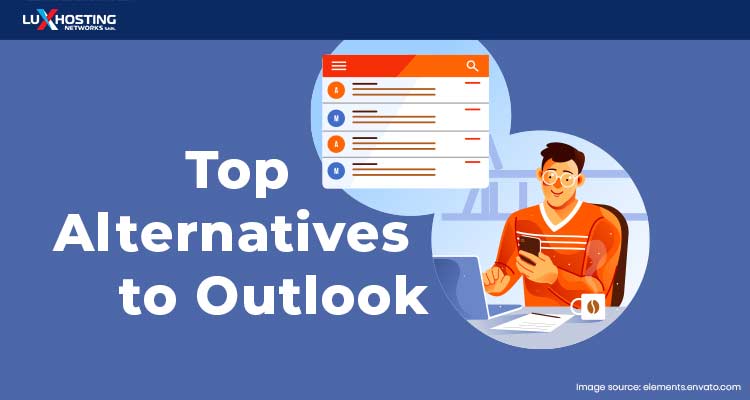If you’ve been looking into email services for your business, you might have come across Microsoft’s Outlook. It’s the most popular choice for business emails. However, in the same way not all hosting plans are fit for every business, not all businesses require the same, expensive email service. If you’re wondering what exactly Outlook is, how it works, and which Outlook alternative would be better for you, then look no further.
Webmail vs Email Clients
Typically, email services are delivered through two media: WebMail and email clients. Webmail is email that you access on the web, using a browser or some web application. An email client is software that is installed on a local device and you use it to access your email from various remote email servers (such as gmail, yahoo, outlook.com etc). Outlook is one such software. Standard email clients also have features such as scheduled emails, integrated calendar, task manager, and contacts module. The best forms of WebMail can do all the same things, just not locally on your computer.
Outlook.com vs Outlook
Outlook (the email client) is not to be confused with Outlook.com. Outlook.com (which replaced Hotmail) is a Webmail email service offered by Microsoft. It’s free to use for individuals and the email addresses use the Outlook domain name (@outlook.com). Outlook forms part of the suite of productivity applications offered by Microsoft (such as Word, PowerPoint, etc) that you can license for a fee. Most businesses opt for Outlook because it comes as part of the various Microsoft 365 packages offered to businesses. What’s more, the packages allow for custom email domain domain names (eg. [email protected]). While this can be appealing, the catch is that the service comes at a hefty price point. In fact, whether you choose to use the Outlook email client only, or get a full Microsoft 365 package for your business, it can amount to a significant dent in your budget. So why not explore other options? No need to box yourself or your business into a particular kind of email service because you think that’s what you should have. Think more about the exact needs of your business and do research to see which Outlook alternative might be right for you.
5 top alternatives to Outlook

1. Email Hosting or Webmail
While most web host services offer email services as part of their packages, many businesses choose to look outside their web host to third parties for the management of their emails. Is it really necessary ? You can take advantage of the email hosting services offered to you by your webhost as an Outlook alternative.This is quite convenient for small and medium business (SMBs) who don’t want to shell out extra cash for expensive email clients. Moreover, hosts such as LuxHosting, offer business class email services, allowing you to use your domain name as your custom email domain. This is advantageous as it adds a greater sense of legitimacy and professionalism to your business if your customers receive emails from addresses with your custom domain. It also lets them differentiate between your official email and potentially malicious phishing emails. Moreover email hosting services have more robust spam filters and more secure antiviruses than standard free webmail services. So if you already have paid web hosting, check out their email services and get yours set up. https://youtu.be/CRXKTuKrD1A You can even manage those emails through third party email clients (such as the ones we’re about to mention) if you so desire.
2. Google Workspace
Google Workspace is probably the most competitive Outlook alternative for those who still want to get an entire integrated productivity suite similar to Microsoft 365. It is a suite of cloud-based productivity software and services that includes business email in its packages. It comes at a price point slightly lower than Microsoft 365 for equivalent packages. Most appealing is the familiarity most people already have with Gmail and other Google tools, which makes Workspace more comfortable to them.
3. Mozilla Thunderbird
Thunderbird, brought to us by Mozilla, is our next Outlook alternative. Unlike Outlook, it is an email client that is free and open-source. If you already have a hosted email server, you can set up Thunderbird with your custom domain email — as with regular email clients. Alternatively, Mozilla Thunderbird works alongside two other email service providers, Mailfence and Gandi, that offer email services and custom business email at an added price. Check out the easy steps to set up this email client below: https://www.youtube.com/watch?v=J8dMOQ9BVm4&t=4s
4. eM Client
Moving back into paid territory, eM Client is another top Outlook alternative. eM Client has all the standard features that one could want in an email client, but at a price point much lower than Outlook. Moreover, there’s a free version of eM Client available if you have no more than 2 email addresses to use with the client though features are very limited with the free version.
5. Mailbird
Mailbird is another great Outlook alternative for managing your emails. A great feature of this client is that it integrates many of your favourite tools and social media such as Facebook, Twitter, WhatsApp, Google Drive, Google Calendar, and the list goes on. This truly enhances it’s capabilities as a productivity tool. With a business plan priced at €49 yearly to license 3 devices, it’s highly attractive to SMBs and one person businesses.
Others
We’ve shown you some of the top Outlook alternatives. However, this list is by no means exhaustive. Other email clients you can check out include:
- Mailspring
- Spike
- Airmail
- INKY
- Protonmail Just to name a few.
Conclusion
Whether it’s types of hosting or types of email, don’t feel the need to spend exorbitant amounts of money for something you don’t need. Paying for Outlook might not be the best option for you or your business. In fact, there may be many other options out there that are more suitable like Hosted Emails. Take time to look into various email services, including clients and email hosting. Then, decide which Outlook alternative is best for you and your company. You’ll be glad you did.



